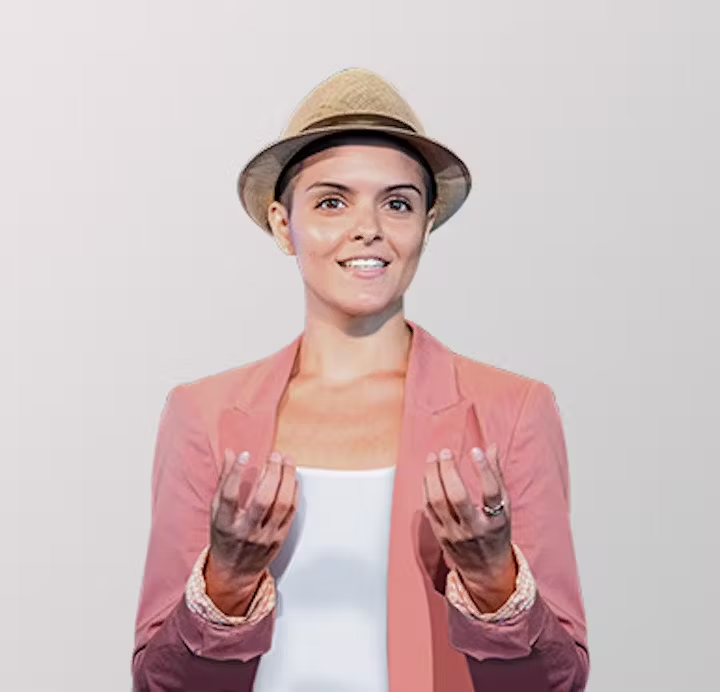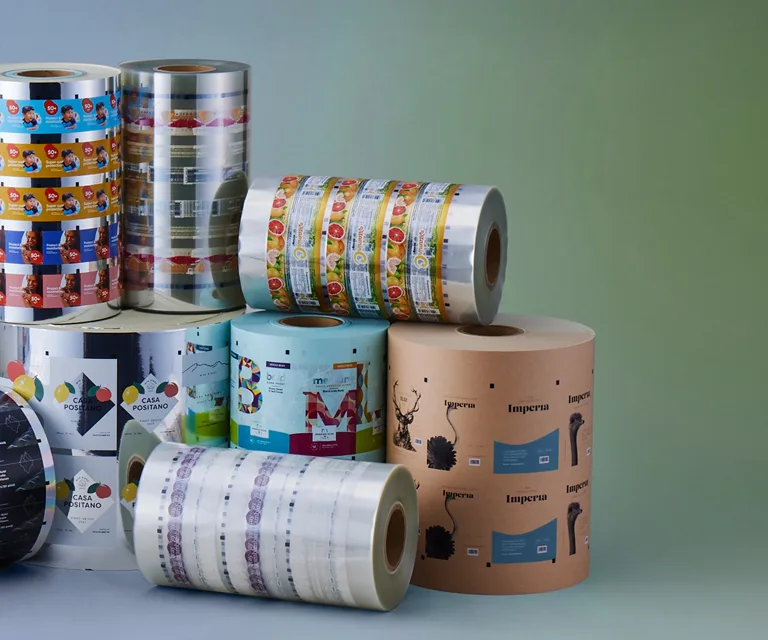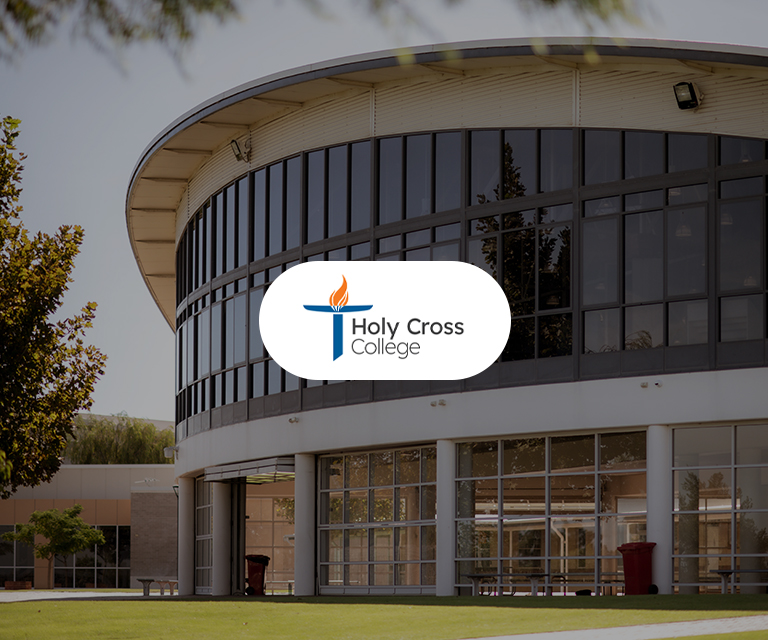Meet Sandra Arico
Head of Innovation, Swisse Wellness
Sandra was a young woman on a fast and bright career track when she decided to leave corporate life and test herself in some very extreme conditions. Find out how a decision to go from having it all to having almost nothing developed Sandra as one of the most exciting young minds in the Australian business landscape today.
Anyone can contribute if they open their minds to connecting concepts or people that aren’t usually aligned. Think cooking and putting ingredients together to create exciting fusions – Japanese Tapas anyone?
Sandra Arico represents the new generation of leaders. She is described as an enabler, a connector and a change catalyst. Having learnt from and been influential within Deloitte Digital, the CSIRO and RMIT University on her path to Head of Innovation at Swisse Wellness, Sandra has a great perspective on nurturing creative yet practical mindsets across industry sectors. She reveals that it was her year living in a Guatemalan jungle that brought a clarity to her resourcefulness and a quirky capacity to join the dots. But Sandra believes everyone has the capacity to innovate because we can all play a role by being our unique selves and connecting our own experiences and ideas in new ways.
Sandra is very clear that innovation is not just for special people who are working in certain environments. She firmly believes anyone can contribute if they open their minds to connecting concepts or people that aren’t usually aligned. Think cooking and putting ingredients together to create exciting fusions – Japanese Tapas anyone?
The Evolution of an Extreme Brain
The abbreviated story of Sandra’s evolution is that she graduated from RMIT University with an Entrepreneurship degree and two prestigious university awards – the RMIT Business Medal and the Patricia Guthrie Memorial Award. She was scouted by the CEO of Deloitte Digital to help drive innovation within Deloitte – a conservative professional services firm. Having helped them build a successful online education business from the ground-up, Sandra resigned and headed for a year in the jungles of Guatemala. On her return, she took her vision, creativity and commercial talent to the CSIRO and to early stage start-ups and community-building initiatives. Then on to RMIT where she managed a thriving industry-based innovation program.
Now let’s back up a little and see how Sandra’s accumulated, disparate life experiences have given her the clear-eyed confidence to defy conventional logic and predictability.
When deciding on a degree, the traditional paths didn’t excite Sandra. Her first foray was a double degree in business and psychology but she found the curriculum and the thinking was disappointingly trapped inside 1960s textbooks. To the horror of her parents, she dropped out – and into her first mindset awakening, thanks to her then-boyfriend’s father.
In him she found someone operating outside the norms of what success was supposed to look like. He was an ex-country, ex-footballer, whose wife taught him to read, and who had establish a thriving printing business with no business training whatsoever: “I was in always awe of him – what he had managed to achieve both in his incredible AFL career and then his entrepreneurial success. How could he have done it all? I felt like I had to soak up everything I could from him and his operation. I realised that what set him apart was his mindset. He taught me to be undaunted by not knowing how to do something and to just go ahead and put myself out there”.
A Fit for the Insatiably Curious
Then, in 2008 she came across a completely new university degree. A course in Entrepreneurship was unheard of then but the ethos and remit of that program was to challenge the status quo and this appealed greatly. Sandra explains: “Everything was new and fresh. From the start we were to be innovators not students. We were immediately thrown into coming up with a business idea that we had to register and take to market. It was such a different way of thinking.”
Sandra’s cohort was also given a real-life project, in partnership with Deloitte, where they had to take a live concept and make it a commercial reality: “It was scary to challenge C-level suits with our ideas. Particularly so when we’d discovered that their strategy for the concept couldn’t succeed. We proposed an entirely different direction – and got grilled for it. But they took up our recommendations and didn’t invest big dollars in what we thought was the wrong project. The experience taught me to back myself and also to make sure – as a team – that we had the evidence to show we weren’t acting on a mere hunch.”
The thinking inculcated in Sandra is that “we should never be too quick to blindly accept what a big exec or a big brand says, just because they are who they are. Start with the openness that ‘they could be wrong’, not simply ‘how do we accept the status quo and just do what we’ve been asked’. Look at the market. Talk to people. Test. Create prototypes. Test. Every next step should be guided by intuition and creative exploration, but also be informed by evidence.”
From her experience, Sandra advocates that when you’re pitching your ideas or pushing back against ‘those who know’ you can’t just use gut feel, you also have to be totally prepared: “If you’re going to swing change – small or large – you have to do it fully equipped with your package of connected ideas, creativity, collaboration, research and testing. It’s the full picture that creates the magic.”
Peter Williams, described by Sandra as the “weird, wacky T-shirt wearing” head of Deloitte Digital (now CEO of Deloitte Centre for the Edge), was the next person to have a lifelong impact on her.
“I was young, new and worried about putting ideas forward at Deloitte. Pete actively tried to drum out the square part of me. He told me to “get in harm’s way by asking all the questions, including the dumb ones and to just ‘have a crack’,” Sandra says. From this, she can attest that true leadership harnesses the capability of others and empowers them to turn their ideas into reality. Ego-free leadership provides a safe place and opportunities to fail so that no great idea is lost. Under such leadership, Sandra excelled at Deloitte Digital and was on a major career trajectory when she opted out. In a matter of months, she went from a comfortable corporate existence to the thick of the central American jungle.
It was a self-described, quarter-life crisis triggered because: “I had to get some space to ask myself the big life questions. Did I really want the path I was on? What was I was really made of?,” she says. When a friend sent a two-line text from Guatemala saying “you’d love it here”, Sandra had the trigger she needed to find out.
Being exposed to completely different people, cultures, expectations and experiences in her jungle home meant Sandra had no comfort zone to hide in – either physically or mentally: “It was extremely humbling and, interestingly, was one of the happiest times of my whole life because I had absolutely nothing”. Not surprisingly, “when you’ve lived in a third-world country and been through some pretty gnarly experiences, your perspective on what’s difficult changes completely,” Sandra says. And an incredibly arduous 50 day silent retreat during this time also altered her life view. From this time “I became much more resourceful and learnt how to connect the dots in different ways”.
Public and private sectors always learning to learn.
On her return to Australia, Sandra joined the CSIRO with the aim of bringing more commercial insight and rigour to the organisation: “CSIRO scientists are so incredibly brilliant and so passionate about their areas. But in my time there, they were often hard-pressed, and without incentive, to consider things outside their day jobs. Trying to bring improvements or to do ‘big things’ was hard. I was both sad and a little frustrated as there was so much potential being lost. I was always looking for ways to connect people and asking myself ‘how do I get them to unleash their amazing capability?”
The next phase saw Sandra return to her alma mater as a catalyst for change: “We created a grassroots innovation program for RMIT that worked to build on and release multiple layers of creative potential. It was funded outside the traditional uni structure because few could understand its impact – real-world innovation with real outcomes – and the exponential value for both students and industry. We did everything makeshift until we proved it worked and were able to bring the uni’s management on board.”
The crux was exposing students to being change agents by being the impetus for it. And, doing the unpredictable, the Fastrack Innovation Program students were required to innovate for some of the most unlikely targets – the financial and legal sectors. Because students had very little knowledge of these traditional sectors or the systems they worked within, they also had no preconceptions and questioned everything. They were given real challenges, and then the supportive environment through their facilitators and peers, to try things and make mistakes. While the clients were often very sceptical that student-led innovation could play any part in their success, year after year teams successfully pitched their solutions, with many going on to receive significant amounts of funding to actually make them happen.
Word spread about how Fastrack was making some unusual connections and having fantastic wins: “Victoria Legal Aid’s subsequent investment in innovation and using design thinking to solve legal challenges was a great example of our positive impact,” Sandra says.
A key piece of advice from Sandra is that if a great idea is set to transform the business, but innovation is not core business, the project will quickly die off if it doesn’t secure a passionate, C-level champion to advocate for it and drive change forward.
From her experience at the CSIRO and within educational institutions Sandra has proven that “even where there’s treacle slowing traditional business structures, creating autonomous internal cells can provide an agile nucleus for innovation and stepped change”.
Onwards to Swisse
Sandra is very excited by her new role as Head of Innovation at Swisse Wellness as it makes its global foray. She is charged with making the connections and driving the creativity that is to influence product, brand and corporate development. This is innovation with not only an outward perspective but also an internal remit to help the international business find synergies and a coherent approach to driving it forward.
“Any role with ‘innovation’ in the title needs to be quite loose. If Swisse had said ‘this is exactly what we want and these are the deliverables’ then I’d know they probably didn’t have it quite right,” Sandra says. But she’s been asked, deceptively simply, to help bring Swisse into the new global era. “I have the flexibility to make this area my own. As with many of my past roles, I once again don’t have their specific market sector expertise, which means I can hopefully shake things up by bringing new perspectives and asking all the dumb questions!”
All individuals interviewed for this series were selected based on their professional standing and experience, and are wholly independent of any commercial relationship with Konica Minolta. Their comments and insights were provided freely without any form of payment. None of the comments provided constitute an endorsement of Konica Minolta products or services.





